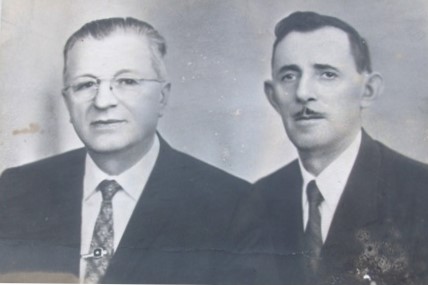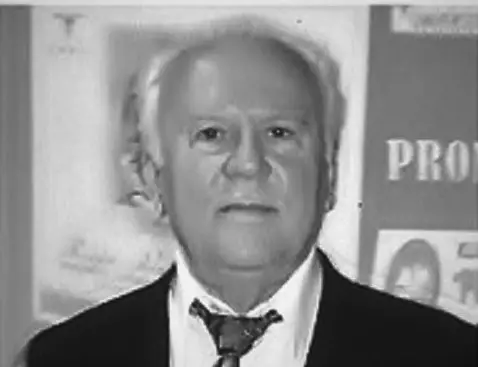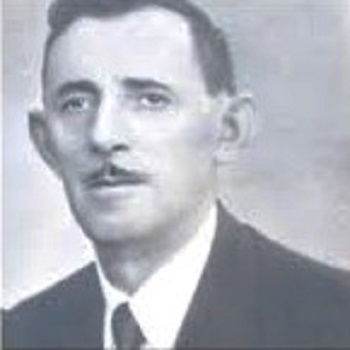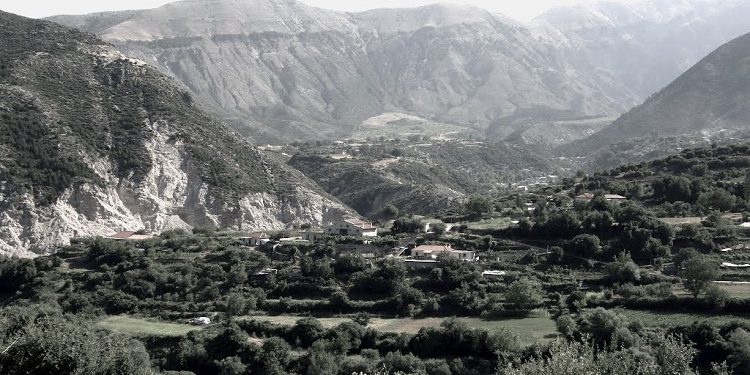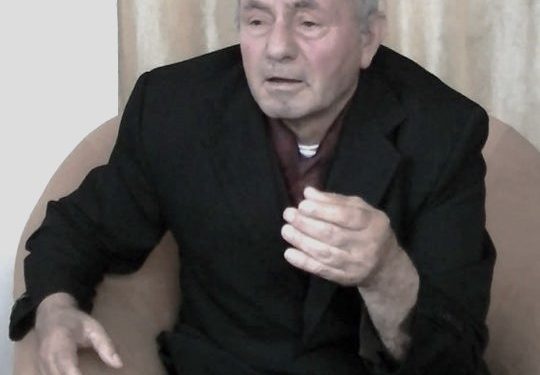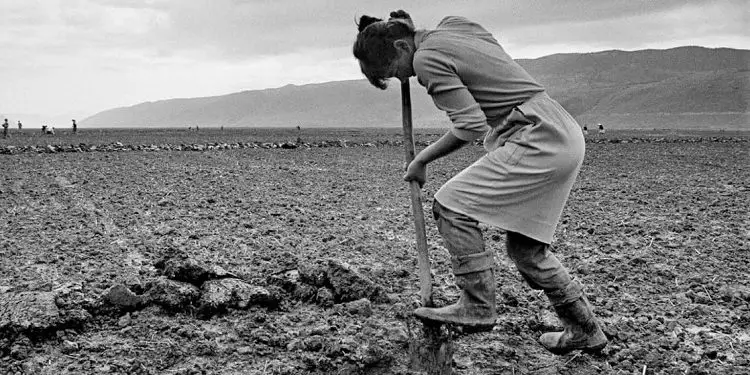Enver Lepenica
Part Two
Memorie.al / In 1948, Veledin Bilbili left the State Security with their mouths agape after they went to arrest him at his home in Dukat. He escaped through a secret door of the house and fled. In April 1949, he disembarked from a submarine in Karaburun and took nine fellow anti-communist idealists with him, including the father of the notorious general, Halim Xhelo, who had gone to Dukat to arrest his own father. This escape infuriated the State Security, who, in turn, exercised inhuman reprisals against the families and bases of the fugitives!
Continued from the previous issue
Veledin Bilbili was first arrested in 1945 for the killing of a partisan and the arrest of Ramadan Alushi. For 45 consecutive days, he was tortured during the investigation, but he was released for lack of evidence. The second time he was arrested was in September 1948 in Himarë, where Veledin had gone to talk with his friends about fleeing to Greece. This time, he was helped by Izeir Nuhu, a Cham Security officer who had stayed in Dukat and had been helped by Veledin’s family.
This is how the arrests of Veledin Bilbili continued. The fourth time they went to arrest him, the Security found Veledin on the roof, fixing tiles. “Go inside,” Veledin told them, “I’m coming down!” In reality, Veledin went down and exited through the back door of the house and from that moment on, he fled, pursued everywhere, step by step, by the forces of the State Security and their spies. In 1949, he was sentenced to death in absentia, and in 1959, he was not pardoned by the amnesty issued by the Albanian government.
In Flight in His Homeland!
Veledin slept outside for many nights. On cold nights, he would spend the dawn in empty livestock huts in the mountains. When dusk came with the darkness, his wife, Velideja, along with their son, Idai, would bring a bull with a sack of food tied under its belly and take it to Veledin. If they met anyone on the road, they would say they were taking it to its owner, Musa Goxha. And if they met someone on their way back, they would say that the bull had run away and they found it near the Goxhajs! This is how they spent night after night.
Based on a signal he received from his wife and son, Veledin would also come home to change his clothes. They had agreed on this signal: his wife and son would check the area, and if they didn’t see anything suspicious, they would hang a red rug on the wall. One day, at dusk, Veledin saw the red rug and arrived home with great speed. Not even five minutes passed before there was a knock on the door. It was the first time Veledin didn’t suspect the worst and went to open the door himself. He was met by armed pursuit forces.
“I’ve come,” Veledin told them, “just let me get my hat!” He went inside, and with his characteristic agility, he escaped through the back door of the house, climbing over walls and fences. This was the fifth time he had escaped from the communist forces and the last day in his own home. From that day on, he never returned home and never saw his wife, his loved ones, or his many homes and properties that he had built with so much hard work and sweat. The State Security was now tracking him relentlessly. He didn’t spend a second night where he spent the first. As soon as the Security learned where he was, he had already fled from there.
Honor and respect to all the families of Dukat who kept him hidden, and sheltered their son, just like many of their other sons. After 1990, in freedom, these brave and noble families recall that Veledin would spend more nights standing up than lying in those wooden beds that the poor but honest villager offered, and he would wait until four in the morning to be able to leave, so the dark shadows of the Security wouldn’t find him there.
Fadil, Veledin’s son, writes in his memoirs: “My father left, but how he left, only his soul knows?! How he was torn from that house with pain and longing, for the wife he left alone at a young age, with pain for his six beloved children he was leaving behind. He was leaving behind all his sweat and blood. The work he had turned into capital, but his head was worth more than all the capital, etc.
His wife would no longer see her husband, the shelter of the house where they had lived a good life for the few years they were together. The children would cry and their mouths would no longer say ‘father.’ He would no longer cast a shadow in the place where he had lived, worked, and fought for 45 consecutive years. All that was left for the children was the rifle hanging on the wall. The hand of that brave, formidable, and sharp-witted man would no longer touch this weapon.”
Fadil continues below: “But for the family tragedy to be complete and to satisfy the communist beasts, along with my father’s escape, my mother had to be interned. A young Albanian mother had to be forcibly removed from her family nest, even though she was pure, honest, and without any fault. That newly created nest with its ‘little swallows’ had to be destroyed. Even though the ‘little swallows’ had just begun to chirp. They had not yet grown wings to fly. Even the older ones who thought they had wings, communism clipped them and left them stunted.”
The red hydra had attacked with ferocity, like a rabid beast, a woman with a two-month-old infant at her breast and five minor children – innocent people – but the State Security had to realize its macabre goals. And so, Veledin Bilbili’s wife, with an infant at her breast and her two older sons, was interned in several camps. The three other minor children were left all alone, to fend for themselves.
As Veledin recounted in emigration, from a hiding spot, he had sorrowfully watched this tragic scene of his wife and young children being interned.
After witnessing this scene, Veledin decided there was nothing more he could do in Dukat. He went to Dhërmi to his friends, the Thanas Dallfa family, to help him escape to Greece. His loyal friend quickly found a Greek ship, and from Spileja of Himara, Veledin was in Greece the next morning. It was November 15, 1948.
In Emigration and a Landing in Albania
Veledin began the difficult life of an emigrant in a refugee camp in Greece and Italy. But he never gave up the fight against communism, a fight he continued until the end of his life. These are the reasons he came back to Albania as a landed agent three or four times. In Greece, he came into conflict with some other Albanians over political convictions and finally resigned from the “Balli Kombëtar” and joined the Legaliteti Party. At the wedding of Leka Zog, he brought a gift of one thousand dollars, an amount that attracted the attention of the heir to the throne, and from that moment on, they remained friends until the end of their lives.
Later, his first cousin, Shaqir Bejo, brought him to Canada, along with Cane Dervishi and his son. After a while, he went to Chicago and finally lived in Detroit with his brother-in-law, Jaup Xhezo, from Tragjas. Veledin Bilbili’s life ended in July 1981 in a car accident in Detroit, USA, heartbroken that he never saw his children or Albania again – the country he fought for his entire life. Two years after him, Velideja, his faithful wife, also passed away.
Fadil’s Meeting with His Mother After 12 Years of Separation!
After Veledin escaped, the communists interned his wife. This noble woman, faithful to her husband and to Albania, was first taken to Tepelenë, then to Lozhan in Korça, Valias in Tirana, Cërrik in Elbasan, and finally to Plug and Savër in Lushnja. We will continue the story, now according to the memoirs of Veledin’s son, Fadil:
“They took our mother in the autumn of 1948, with a two-month-old girl at her breast and two sons over 14 years old. The three other minor children of Veledin, the oldest being 7 years old, were left in the village, to fend for themselves. God himself intervened and told a good man to take Veledin’s three children and keep them in his lap, along with his own children.
God gave that good man the strength of mind to light the path of kindness. A good man named Gani Çapaj did just that. In that turbulent time when people were suffering from hunger, but even more from the violence of the State Security, such an action is more than heroism. Gani Çapaj had the courage, bravery, intelligence, beautiful soul, and a big heart. And this heavy burden he took on was not for a short time, but for a full 12 years, from 1948 until 1960.
So, Veledin’s three children were raised together with Gani’s five children. This is what a person raised with the high feelings of love for the homeland, faith in God, and kindness of spirit did; he gave life, alongside his five children, to the three small children of Veledin Bilbili, who were left on the streets.
They took our mother. I can never forget that painful scene—even death would have been easier. They took our mother along with two brothers and an infant. Why did they take our mother, what had she done? What could a newborn do, whose nest was broken while she was sleeping! My two-month-old sister had her mother’s breast as a source of food. But where would the poor mother find a little bread to keep herself and her infant alive?
The three of us had a nest where we gathered, Uncle Gani’s house. The oldest of us was my 7-year-old sister. She replaced the mother whom the red beasts took from us. My poor sister would get up at night and cover us. She would often ask if we were hungry, just to know, because she had nowhere to find a single bite of bread either.
Uncle Gani also sent us to school. I learned a lot. When I came home from school, I would go to the sheep. But wherever I went, my mind never left my mother. Ah! I thought if I had my mother, she would say a warm word to me, which would warm my exhausted body, and a mother’s warm word is a balm!…
It had been 12 years since I was separated from my mother and I had never seen her. She left me at the age of 8 in 1948 when we were separated, and now in 1960, I was 20 years old. My mother had also spent 12 years in suffering and misery, without bread or water, without love, without family, separated from her people and her children while still alive. They had aged her greatly, but they had not destroyed her beautiful soul…!
So, after 12 years, a letter arrived for Uncle Gani in Dukat from my mother, and we learned that she was interned in Savër of Lushnja. She wrote: “Dear brother Gani! I beg you, please bring the three children to me once, so I can see them and then I can die.” The noble man clothed and equipped us with what he had, and we set off with him to meet our mother, after 12 years without seeing her. We arrived in Plug of Lushnja after noon. In the endless fields of Lushnja, many women were hoeing.
Uncle Gani sent me to ask about my mother:
“Where is Velide Çapaj?” I asked the first women I met.
“What is she to you?” they asked me.
“Mother!” I told them.
“She is at the end of the field,” those tired and weary women told me, “the one with that child beside her.”
When I reached the end of the field, I turned to the woman who was hoeing and who had a girl about 10-12 years old beside her.
“Hey comrade,” I said to that woman, “do you know Velide Çapaj?”
“What do you want her for, my dear?” she said to me.
“She’s being asked for on the road,” I said to her.
The suffering woman stared at me, started to breathe with difficulty, and asked me:
“And who are you and where are you from, my son?”
“I’m from Dukat, the son of Gani Çapaj,” I lied.
The woman came close to me and looked me over from head to toe, and so did her daughter. They both stood in the middle and looked at me as if they were bewildered. My heart began to beat fast.
“Don’t lay to me, my dear,” she said to me. “Gani Çapaj doesn’t have a grown son, are you Fadil?” she asked me with a trembling voice.
“Yes,” I said.
My poor mother fell to the ground, while her daughter threw her arms around my neck, kissing me.
“My dear sister, my dear sister!”
That old woman whom I didn’t recognize was my mother; that girl whom I didn’t recognize was my sister. We had been separated from her when she was 2 months old, and now I was seeing her at 12 years old. This is my drama, but how many such dramas have the barbaric communists caused in Albania?
I looked out at the field and asked myself; did the children of these poor women not recognize their mothers just like I did? From that moment on, the three of us – children left orphaned with a mother and father who were still alive-were reunited with our mother after 12 years and lived in Savër of Lushnja!” / Memorie.al




